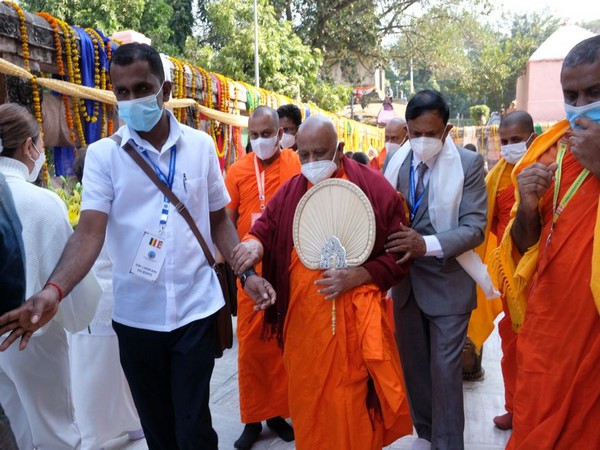India, Sri Lanka are bonded together by Buddhism
A delegation of high-ranking Sri Lankan Buddhist monks, who were on a pilgrimage to Bodh Gaya to attend discourses of the holy city, has recalled the historical Buddhist connections between the two maritime neighbours.

- Country:
- India
A delegation of high-ranking Sri Lankan Buddhist monks, who were on a pilgrimage to Bodh Gaya to attend discourses of the holy city, have recalled the historical Buddhist connections between the two maritime neighbours. Their five-day spiritual visit included discourses and Dharma talks.
Venerable Muruddeniya Dhammarathana, Thero of the Asgiri Chapter said, "We know that emperor Ashoka's son Arahat Mahinda introduced Buddhism to Sri Lanka. From that day up to now, Buddhism is the main religion in Sri Lanka'." "Not only Buddhism we got a lot of things through him, especially our religion and also our education and other techniques. We got a lot from Buddhism so we greatly appreciate the situation, and we always respect India as a Buddhist motherland and also as our Elder brother of Sri Lanka because India always helped us even at present we have economic troubles going on," he added.
The members of the Buddhist Sangha representing eminent monasteries in Sri Lanka attended the three-day holy teachings of His Holiness Dalai Lama in Bodh Gaya. The Most Venerable Makulewe Wimala Mahanayake Thero, Chief Prelate of Sri Lanka Ramanna Maha Nikaya remembers how Lord Buddha visited Sri Lanka and the spread of Buddhism during the reign of Emperor Ashoka.
"The Buddhist philosophy was born in India and Buddha lived in India. So, according to history, the Buddha visited the only foreign land and that is Sri Lanka. He visited Sri Lanka three times. During emperor Ashoka's time, he sent Buddhist missionaries like his own son and daughter to Sri Lanka and they established Buddhist rule and culture. Since then we have been sharing the same culture and tradition. Now, we have become a Buddhist country because of that," he said. Theravada Buddhism is the largest and official religion of Sri Lanka, practised by roughly 70 per cent of the population.
Most Ven Niyangoda Vijithasiri Anunayake Thero, Deputy Chief Prelate (Anunayake) of Malwatte Chapter Siyam Maha Nikaya, said that India and Sri Lanka share almost the same culture that brings the two countries closer. "In our chronicles, we have Mahavamsa chronicles. We protect Buddhism in its pristine purity which means sasna, dhamma, rituals and everything. That is our heritage. I think it is from Indian ancestors and otherwise, our Sinhala Language i.e., Palli is also very close to the Sanskrit language. Actually, we respect the two languages. Our teachers told us that our mother tongue is both Palli and Sanskrit," he said.
Ven. Muruddeniya Dhammarathana said the young generation in Sri Lanka knows the historical significance through their textbooks. "In our school textbooks, Buddhist places introduced for the children. Not only that, we have Sunday school, a Dhamma school, where we also teach kids the background of Buddhism, where was the Buddha born, and the source and situation at that time, and where are the holy places," he said.
A large number of monks from Sri Lanka and other countries visit India to learn about Buddhism and its teachings. Most Venerable Waskaduwe Mahindawansa Mahanayake Thero, Mahanayake Thero, Sri Sambuddha Sasanodaya Sangha Sabha said, "Now, at the moment, 18 Buddhist young monks from Sri Lanka are in India. They will be here for a month, travelling all across India".
"Not only from Sri Lanka, a group of Buddhist monks from Thailand and a group of Tibetan Buddhist monks and a group from Myanmar are in India right now," he said. "India is the birthplace of Buddhism. So, these young monks are travelling across India which will create many connections in the future", he added.
Such visits prove to be a turning point in Buddhist relations, not only with Sri Lanka and India but with other neighbouring countries. (ANI)
(This story has not been edited by Devdiscourse staff and is auto-generated from a syndicated feed.)










